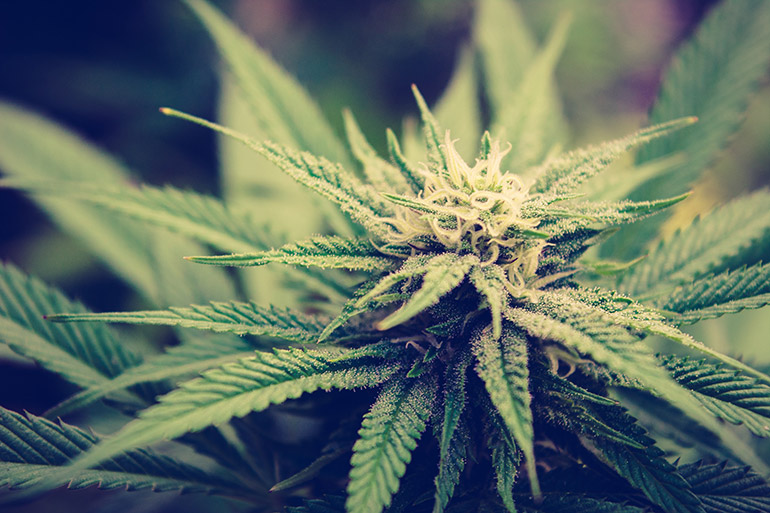
Analyzing parental and then subsequent teen use of cannabis can provide important information in terms of intervention. Photo by Esteban Lopez on Unsplash.
UBCO research shows understanding teen use helps develop effective prevention programs
Turns out the old adage, “monkey see, monkey do,” does ring true — even when it comes to cannabis use. However, when cannabis use involves youth, it’s see, think, then do, says a team of UBC Okanagan researchers.
The team found that kids who grow up in homes where parents consume cannabis will more than likely use it themselves. Parental influence on the use of cannabis is important to study as it can help with the development of effective prevention programs, explains Maya Pilin, a doctoral psychology student in the Irving K. Barber Faculty of Arts and Social Sciences.
“Adolescence is a critical period in which drug and alcohol experimentation takes place and when cannabis use is often initiated,” says Pilin. “Parents are perhaps the most influential socializing agent for children and early adolescents.”
Pilin says it has long been assumed that parental use of cannabis contributes to higher levels of adolescent use. However, while there has been research about parental use of alcohol and whether their children drink, there is less known about pathways to cannabis use.
“What we found mirrors closely what has been found in past research with alcohol use — that parental use influences adolescents’ use as well,” she says.
For their research, the team used data from a survey of almost 700 students in Grades 7 to 9, which is when previous studies demonstrate that cannabis use increases dramatically. Each year, the students were asked over a three-year period, if one or both of their parents used cannabis, if so, how frequently and whether they also use it. As the students aged, their cannabis use began and increased.
This data was collected before cannabis was decriminalized in Canada in 2017.
“We wanted to try and explain, how parental use, while their kids were in Grade 7, would be associated with their kids’ use by ninth grade,” says Dr. Sarah Dow-Fleisner, a researcher with the School of Social Work. “We hypothesized that early parental use would impact how teens think about cannabis use, in particular whether parental use early in adolescence would be associated with more positive expectations and perceptions of cannabis use by Grade 8, and whether that would lead to an increased chance of using cannabis by Grade 9. What we thought is exactly what we found.”
UBCO Psychology Professor Dr. Marvin Krank funded the research and collected the data for the study in collaboration with Okanagan valley school districts.
“This work is an important extension of previous studies about how parents influence their children’s cannabis use in subtle ways,” he says. “Children of parents who use cannabis have more associations and positive thoughts that quickly come to mind in response to cues associated with cannabis use. Such quick and automatic thinking influences their choices often without their awareness.”
Analyzing parental and then subsequent teen use of cannabis can provide important information in terms of intervention. Effective interventions need to consider the way youth think about cannabis use and how that has been shaped by parents, says Pilin.
Understanding the reasons for early cannabis use is essential to developing effective prevention programs in these formative years, explains Dr. Dow-Fleisner, as early use of cannabis is associated with harmful effects on mental and social developmental outcomes. It also increases the chance of experimentation with other drugs and greatly increases the risk of being diagnosed with a substance-use disorder in adulthood.
“What is important is that we do see across the literature that parent use and experiences with cannabis in early adolescence are linked with cannabis use later in adolescence, and part of this relationship has to do with the way teens think about cannabis,” she adds. “It helps us think about ways to intervene and prevent cannabis use — our interventions must address how youth think about substance use based on their familial and personal experiences.”
The research, funded by grants from the Social Sciences and Humanities Research Council of Canada and the Canadian Institutes of Health Research, was published recently in Addictive Behaviors.
About UBC’s Okanagan campus
UBC’s Okanagan campus is an innovative hub for research and learning founded in 2005 in partnership with local Indigenous peoples, the Syilx Okanagan Nation, in whose territory the campus resides. As part of UBC—ranked among the world’s top 20 public universities—the Okanagan campus combines a globally recognized UBC education with a tight-knit and entrepreneurial community that welcomes students and faculty from around the world in British Columbia’s stunning Okanagan Valley.
To find out more, visit: ok.ubc.ca